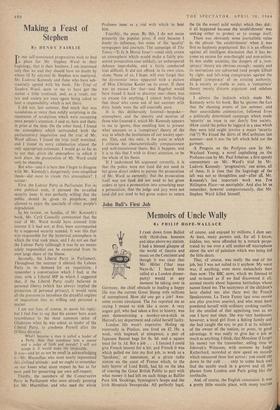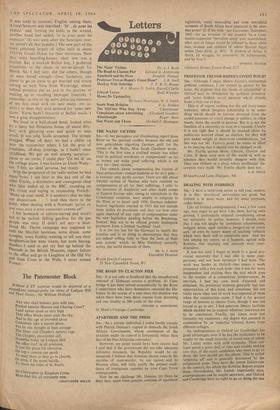John Bull's First Job
Memoirs of Uncle Wally
By PHILIP HOPE-WALLACE
London life wasn't expensive. Holing up eventually in Pimlico, one lived on £2 18s. a week, with bagwash at ninepence, a pair of Japanese flannel bags for 8s. 6d. and a square meal for ls. ld. But a job . . . I fancied I could give French lessons for a bit; and French it was which pulled me into my first job, to work as' a `Speakeur,' or announcer, at a pirate radio station on the coast of France which, to the holy, horror of Lord Reith, had hit on the idea of coaxing the Great British Public to part with what money it had left on such things as Ballito Pure Silk Stockings, Symington's Soups and the Irish Hospitals Sweepstake. All perfectly legal, of course, and enjoyed by millions, I dare say. At least, many parents and, for all I know, kiddies, too, were offended by a remark perpe- trated by me over a still unshut-off microphone about the sort of pabulum which was being fed the little dears.
That, of course, was really the end of the job, but I was not suited to it anyhow. My voice was, if anything, even more melancholy then than now. The BBC news, which we listened to and re-issued as if we had discovered it all, seemed mostly about Japanese battleships whose names foxed me. The mateyness of the children's hour eluded me; also there was the French Speakeuresse, La Tante Fanny (qui vous envoie son plus gracieux sourire), and .who must have powdered herself with ordinary cooking vanilla, for she smelled of that appetising root as no one I have met since. She was very handsome, however; a local girl from a fishing family and she had caught the eye, to put it at its mildest, of the owner of the station, or poste, to good advantage. It was really to give her a job as much as anything, I think, that Monsieur (I forget his name) ran the transmitter, selling time to Jehovah'si Witnesses, with sermons by Judge Rutherford, recorded at slow speed on records which measured three feet across: you could nip down to the café . . . only to come back and find the needle stuck in a groove and all the phones from London and Paris going like the toothache.
And, of'course, the English concession. It was a pretty little seaside place, with many tourists (1 was told) in summer; English among them. A local lavatory was inscribed: 'M .. de pour les anglais,' and, turning the knife in the wound, another hand had added, 'et la p.sse pour les anglaises.' (It was soon after the Sanctions row;
we weren't all that popular.) The new part of the town consisted largely of villas built in about
1910 by Grand Dukes for their mistresses. Now they were boarding-houses, shut; one was a brothel. But, a bookish Balliol boy, I preferred excursions to the shops in not-so-distant Le Havre. So, I feel sure, did the others, though all were bored enough—three bachelors, one about 'to go on leave to get married and return among us with Vera from Weybridge, whose refined presence put an end to the pastime of making up or recalling improper limericks. I remember, as one of the more defeating moments of my first meal with my new mates my in- ability to meet their avid demand for 'some new yarns.' Yarns hadn't featured at Balliol much. I was a great disappointment. We lived in a half-closed hotel, Looked after by a batty but flirtatious bonne of about fifty- five, with glittering eyes and quick to take insult. It was cold. Gulls screamed. The shingle dragged. when off duty, we had a chalet up near the transmitter where I felt the grue of loneliness, off-duty evenings, as I hadn't since childhood. We got on well among ourselves: yarns or no yarns, I could play 1../n bel di' on the cottage piano. 1 was known as Uncle Wally: not, 1 felt, an ideal persona, but matey.' With the proprietor of the radio station we had many 'rows; I can hear to this day one of the other Uncles, a diminutive and courageous chap who later ended up in the BBC, rounding on this tyrant and saying in resounding French: 'Make up your mind. It is necessary that we take our dispositions . . .'; (and then more to the point, when dealing with a Norman) `qu'est ce 'Me vows avez a nous emmerder comma ca?'
1 felt homesick or culture-starved and wasn't sad to be sacked. Selling gas-fires for the gas People was easy. (I didn't sell any—a blue- blood Mr. Therm campaign was supposed to melt the Mayfair hostesses, some drunk, some nYmpho, some frankly wanting to tell you their daughters-in-law were vixens, but none buying, thanks.) I used to put my feet up behind the Pharaoh in the British Museum, report failure to the office and go to Laughton at the Old Vic and Joan Cross at the Wells. I never missed France.







































 Previous page
Previous page